Coastal Guerrero Mexico
(March 30 - April 9, 2018) Link to Annotated Bird List
White-throated Magpie Jay (Calocitta formosa) Refugio de Potosi, Guerrero MX 5 April 2018
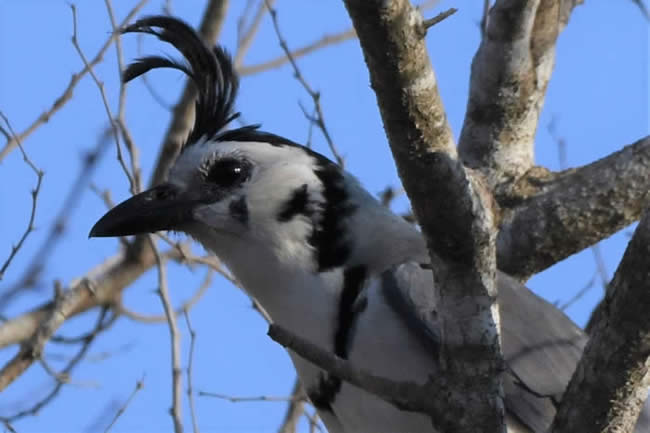
© 2018 Callyn Yorke
Introduction
Throughout Mexico there can be found stunning natural diversity, including unique assemblages of plants, amphibians, reptiles, birds and mammals. Related to a relatively high species endemism, are landscapes of unsurpassed grandeur -- snow-capped volcanoes, several ecologically distinct deserts, triple-canopy rainforests, montane coniferous forests, mile-deep canyons, rolling hills of subtropical thorn-scrub and thousands of miles of remote, picturesque coastline. If a visitor has a fair amount of time, patience, curiosity and a love of adventure, Mexico is a treasure trove of natural history.
Occasionally, over the past three decades during semester breaks, I had concentrated my ornithological efforts in different regions of Mexico, including the Yucatan Peninsula, Oaxaca, Chiapas, Baja and Nayarit. This time I chose the Central Pacific Coast of Guerrero, centered on the twin settlements of Ixtapa and Zihuatanejo.
Map showing the Zihuatanejo area of Guerrero, MX
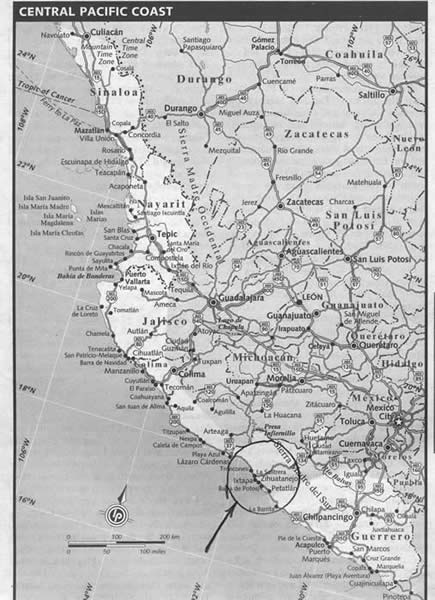
© 2016 Lonely Planet
Conveniently, the international Ixtapa-Zihuatanejo airport is near some good stands of subtropical thorn forest with its unique avian community. Developed areas, particularly with well-watered vegetation, attracted many birds, particularly during this (dry) season. In fact, I quickly discovered that downtown Zihuatanejo was one of the best places to observe and photograph birds of the region. My first morning walk through town, dodging beach-goers, busses and taxis, produced forty-eight bird species, including West-Mexican endemics such as, Doubleday's Hummingbird, Russet-crowned Motmot, Golden-cheeked Woodpecker, Happy Wren, Rufous-backed Robin and Yellow-winged Cacique.
Zihuatanejo, MX 31 March 2018

© 2018 Callyn Yorke
I made Hotel Irma, Playa Ropa, my home base in Zihuatanejo. From the hillside hotel, I walked the narrow streets, lined with deciduous trees and shrubs that were often alive with birds. The flowers and fruits of leguminous trees (see photo below) attracted highly vocal, mixed species flocks of birds each morning. Regular members of these flocks included, Golden-cheeked Woodpecker, Rufous-backed Robin, Orchard Oriole, Streak-backed Oriole and Yellow-winged Cacique. Elsewhere, mostly in isolated trees adjacent to vacant lots, were the less commonly seen species, such as Ferruginous Pygmy Owl (photo), Citreoline Trogon and Doubleday's Hummingbird.
Ferruginous Pygmy Owl (Glaucidium brasilianum) Zihuatanejo Guerrero Mexico 6 April 2018
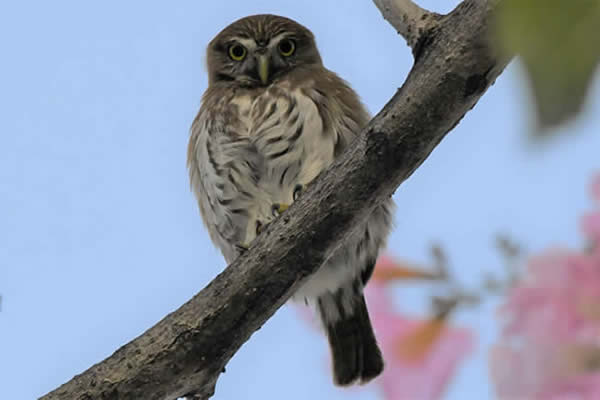
© 2018 Callyn Yorke
Golden-cheeked Woodpecker (Melanerpes chrysogenys) Troncones Guerrero MX 8 April 2018
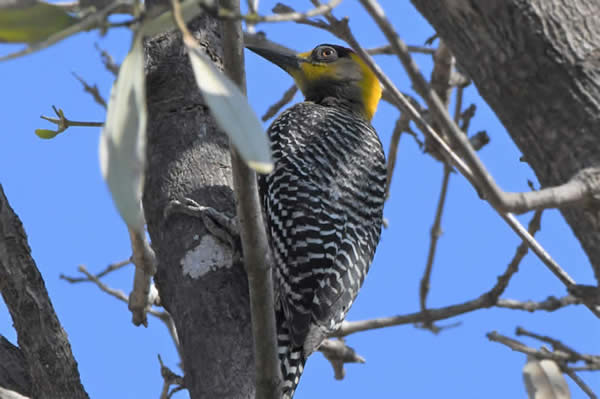
© 2018 Callyn Yorke
Rufous-backed Robin (Turdus rufopalliatus) Zihuatanejo Guerrero MX 31 March 2018
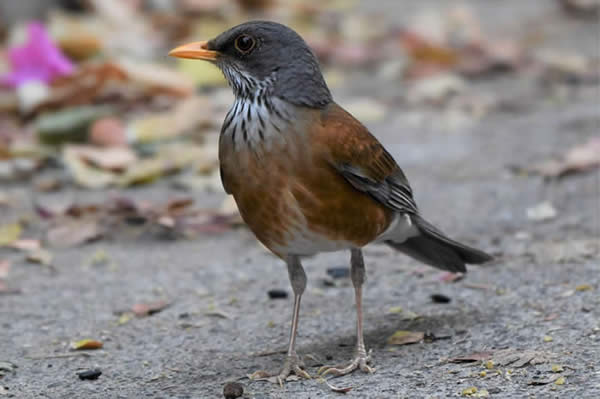
© 2018 Callyn Yorke
Orchard Oriole (Icterus spurius) Zihuatanejo Guerrero Mexico 6 April 2018
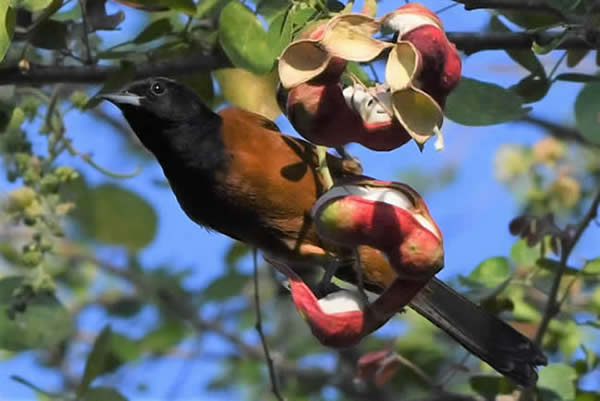
© 2018 Callyn Yorke
Streak-backed Oriole (Icterus pustulatus) Zihuatanejo Guerrero MX 6 April 2018
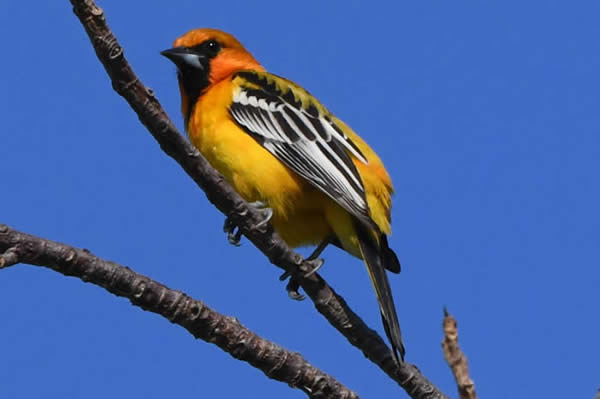
© 2018 Callyn Yorke
A creatively painted concrete drainage channel running through the middle of town produced a number of interesting seed-eaters, e.g. White-winged Dove, Inca Dove (nesting), Ruddy Ground Dove, Common Ground Dove, White-collared Seedeater and Bronzed Cowbird. Males of the latter species were greatly outnumbered by females and immatures (20:1), sometimes displaying a comically fluffed headdress and piercing red eyes, while strutting their stuff around the flock.
Drainage canal, Zihuatanejo, Guerrero MX 6 April 2018

© 2018 Callyn Yorke
Inca Dove (Columbina inca) Zihuatanejo Guerrero MX 6 April 2018
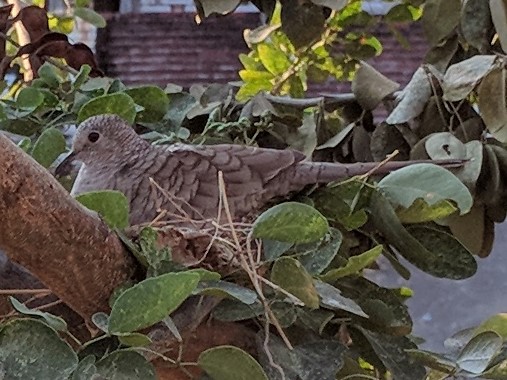
© 2018 Callyn Yorke
Bronzed Cowbird ( Molothrus aeneus) male Zihuatanejo Guerrero MX 31 March 2018
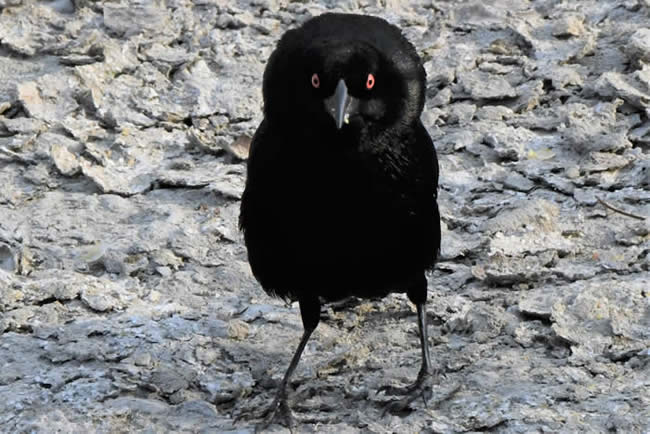
© 2018 Callyn Yorke
Near the shoreline terminus of the drainage canal, a series of blackwater pools, evidently composed of sewage and city run-off, attracted a surprising diversity of waders. Among those found included, American White Ibis, Snowy Egret, Tricolored Heron, Green Heron, Spotted Sandpiper and Least Sandpiper. Most bird species evidently lack enough sensory nasal epithelium to be bothered by the acrid, sulphuric stench. Shrimp appeared to be the principal prey items the large waders were seeking.Yummy.
American White Ibis (Eudocimus albus) Zihuatanejo drainage canal, Guerrero Mexico 31 March 2018
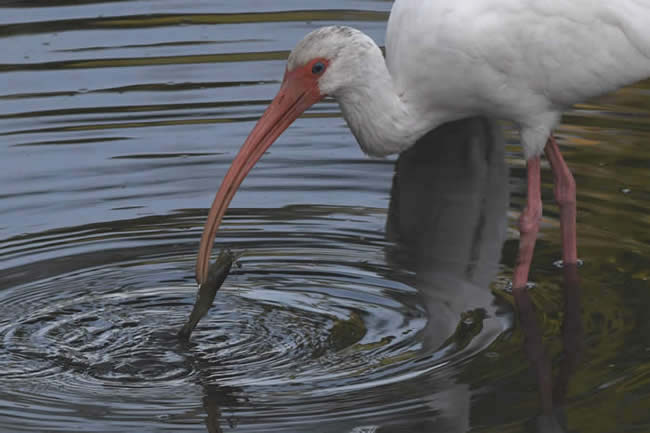
© 2018 Callyn Yorke
Tricolored Heron (Egretta tricolor) Zihuatanejo Guerrero Mexico 31 March 2018
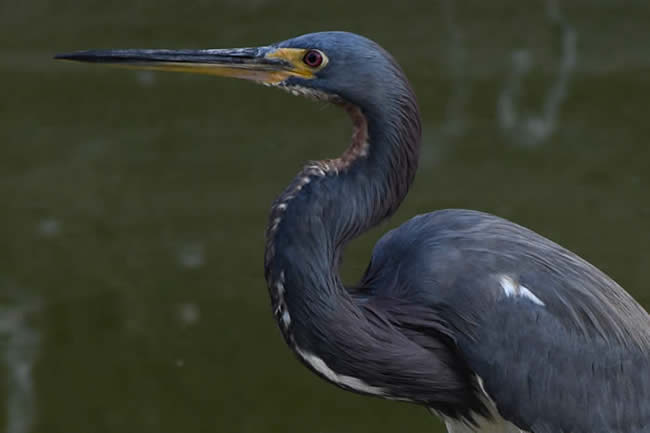
© 2018 Callyn Yorke
After a few days, however, most of these pools dried up in the baking sun, leaving enough moisture in the thin soil to support small clumps of grasses and herbs. Nearly every day I found a slightly different assemblage of birds in and around the drainage canal, including a nesting pair of Yellow-winged Cacique in overhanging trees and a single, quite unexpected, Blue-gray Tanager (photos).The latter species is common within its normal range, but largely confined to the humid tropics of SE Mexico, southward through Central America and Brazil.
Yellow-winged Cacique (Cassiculus melanicterus) Zihuatanejo, Guerrero Mexico
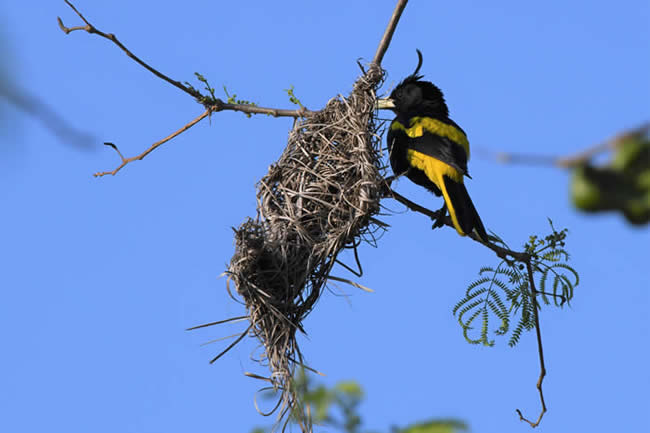
© 2018 Callyn Yorke
Blue-gray Tanager (Thraupis episcopus) Zihuatanejo Guerrero Mexico 31 March 2018
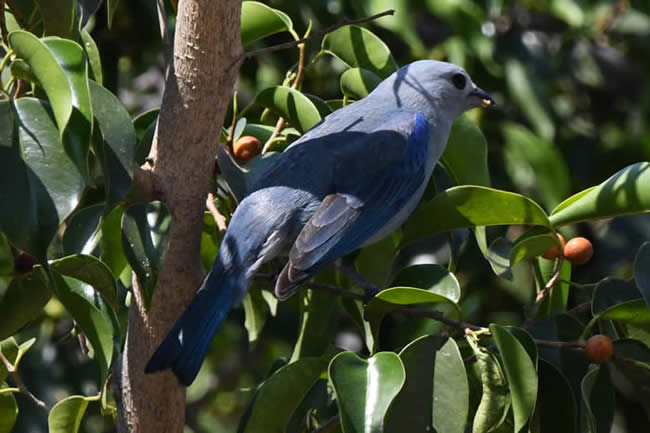
© 2018 Callyn Yorke
Of course, there was an obligatory lunch break at the famous Shawshank Redemption Restaurant in Zihuatanejo. This was one of several excellent, inexpensive eateries in downtown Zihuatanejo.
Shawshank Redemption, Zihuatanejo Guerrero MX 5 April 2018
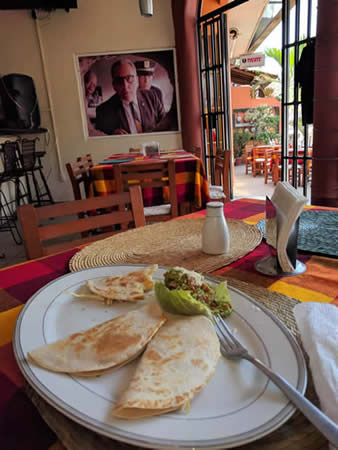

© 2018 Callyn Yorke
I visited other good birding sites, such as Troncones to the north of Zihuatanejo and Barra de Potosi to the south. Both of those locations required a rental vehicle, which was also useful to access good birding areas along the old road between Zihuatanejo and Ixtapa.
The Old Road, Zijuatanejo-Ixtapa Guerrero, MX 2 April 2018
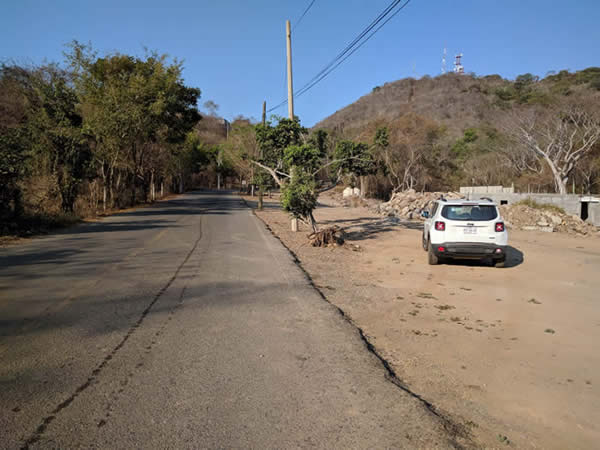
© 2018 Callyn Yorke
Yellow-headed Parrot (Amazona oratrix) Old Road Zihuatanejo-Ixtapa, Guerrero MX 2 April 2018
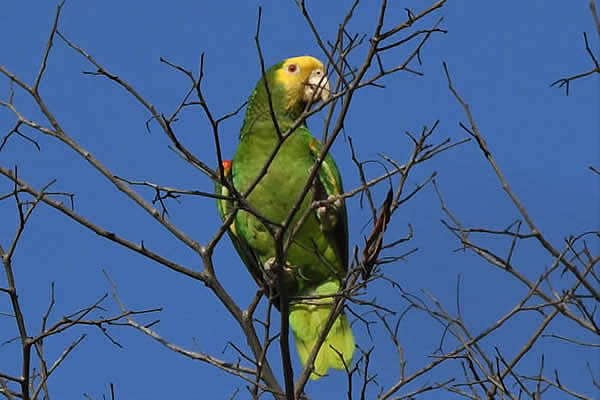
© 2018 Callyn Yorke
Happy Wren (Thryothorus felix) Old Road Zihuatanejo-Ixtapa Guerrero MX 2 April 2018
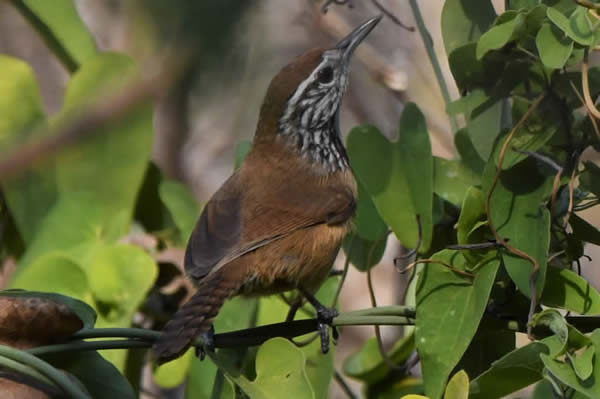
© 2018 Callyn Yorke
Rufous-naped Wren (Campylorhynchus rufinucha) Old Road, Zihuatanejo-Ixtapa Guerrero, MX 2 April 2018
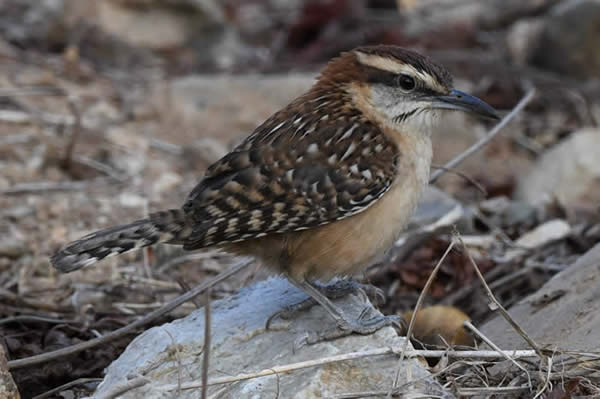
© 2018 Callyn Yorke
Troncones
Troncones, Guerrero MX 6 April 2018
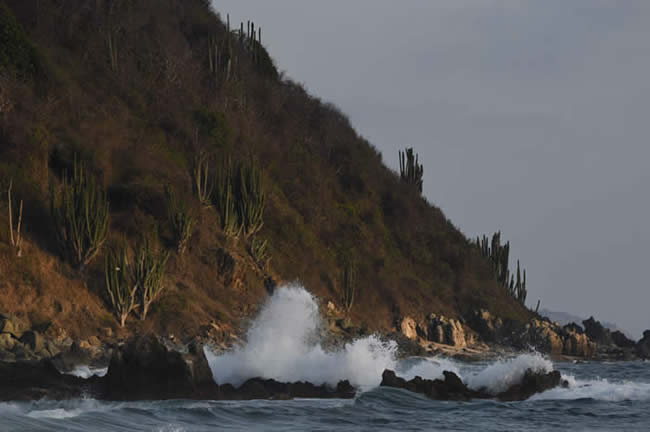
© 2018 Callyn Yorke
About fifteen miles north of Zihuatanejo is the sleepy little village of Troncones. This relatively quiet beach community was a welcomed relief from the huge Easter holiday crowds in Zihuatanejo. I began exploration by jeep immediately upon arrival.
My rental Jeep, Manzanillo Bay, Guerrero MX 1 April 2018

© 2018 Callyn Yorke
From the town center, I drove north on the shoreline road about 1.5 km, then turned right onto a dirt road heading toward the hills. This road, known to birders as the 'parrot track,' continues uphill, northeast through a mixture of thorn scrub and deciduous forest. I parked at the lower (west end) of the road and walked about 2 km to the ridge line, where greeted by a pack of untethered guard dogs. Returning somewhat more hastily and alert along the same route, a platoon of well-armed police passed by in a HUMMER; we exchanged friendly gestures. It was otherwise a peaceful stroll through mostly undeveloped coastal hill country, and occasionally quite birdy.
The 'Parrot Track' Troncones, Guerrero MX 1 April 2018
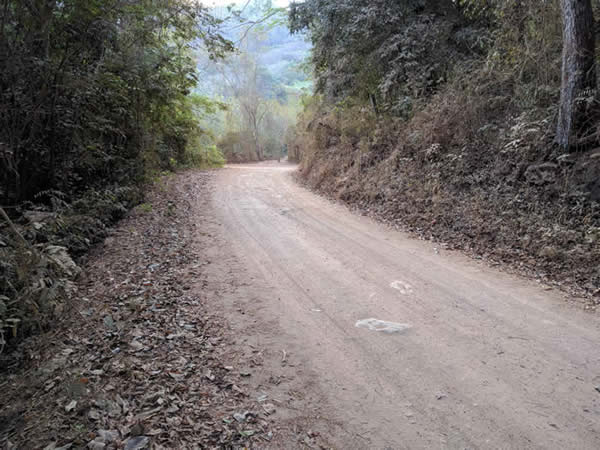
© 2018 Callyn Yorke
Orange-fronted Parakeet (Aratinga canicularis) Troncones Guerrero MX 1 April 2018
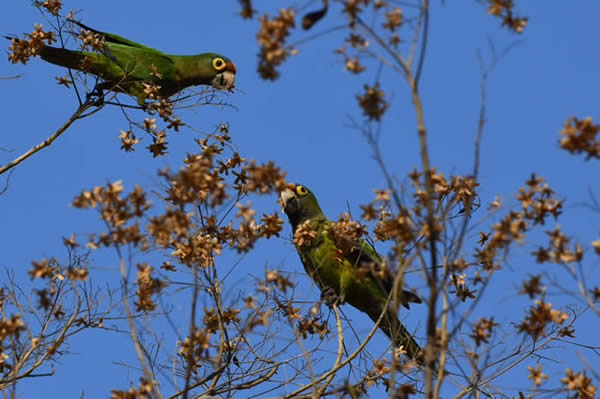
© 2018 Callyn Yorke
White-fronted Parrot (Amazona albifrons) Troncones Guerrero MX 1 April 2018
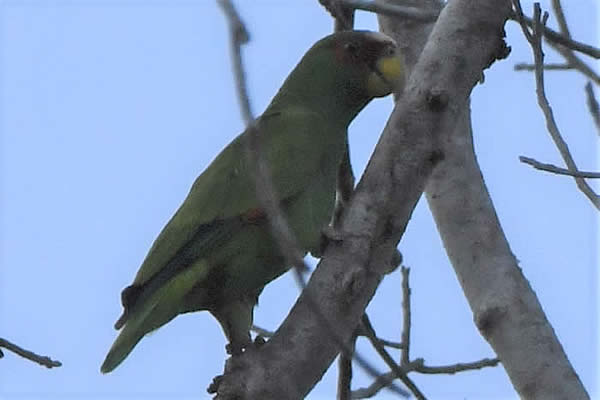
© 2018 Callyn Yorke
Citrolene Trogon (Trogon melanocephalus) Troncones Guerrero MX 1 April 2018
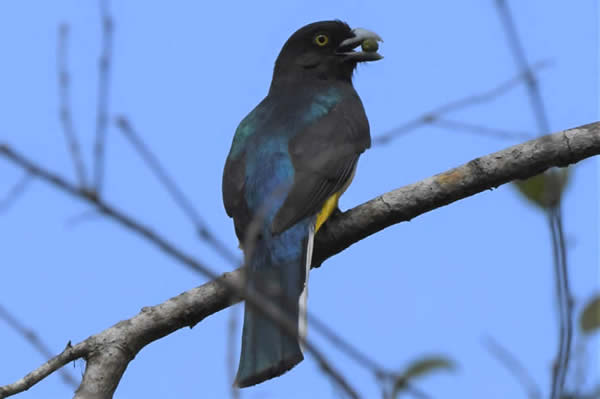
© 2018 Callyn Yorke
Orange-breasted Bunting (Passerina leclancherii) Troncones Guerrero MX 6 April 2018
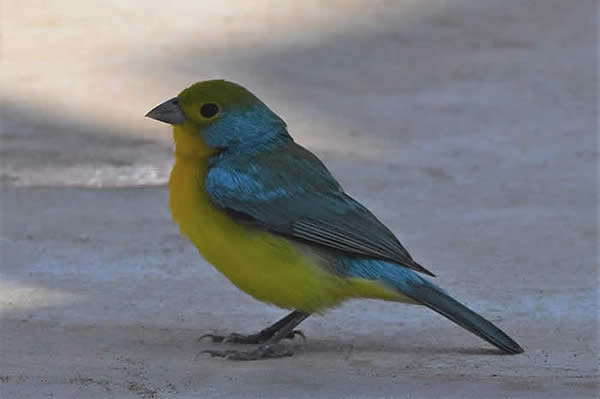
© 2018 Callyn Yorke
There were also unplanned, off-road jeep adventures in the area. Once I high-centered the rental jeep in sand on the shore of Manzanillo Bay and discovered that what was assigned to me as a AWD was actually 2WD. Some friendly villagers teamed up to push me out. Another time, I was trapped on a narrow, sandy road with oncoming traffic. This was on a confusing inland track with twists and turns through open fields, backyard gardens, a coconut tree plantation, eventually terminating at stream crossing known locally as Boca de Lagunillas. There were a few warblers in the trees but not many other birds. The midday heat and humidity was intense. This soon became a popular swimming hole for some villagers, which effectively ended my solitary birding session.
Boca de Lagunillas, Manzanillo Bay, Guerrero MX 1 April 2018
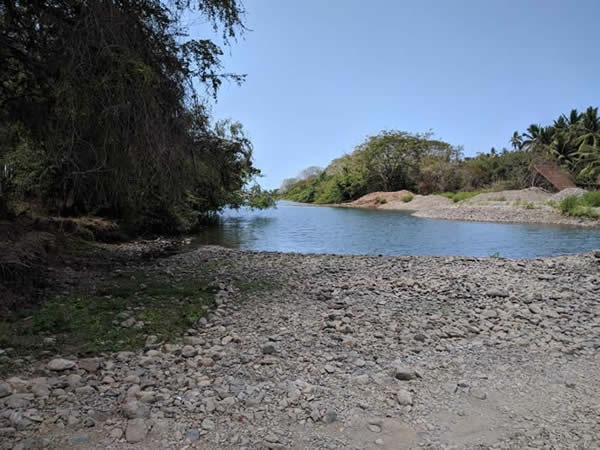
© 2018 Callyn Yorke
Near the end of my 10-day trip, I returned to Troncones and rented a room in a small beach resort. That gave me a little more time to explore the area. I had intended to go surfing in the afternoons following birding, but the waves were small and wind-blown. Otherwise, the birding around Troncones continued to be quite productive, though by then, relatively few species were added to my trip list.
Green Kingfisher (Chloroceryle americana) Troncones Guerrero MX 6 April 2018
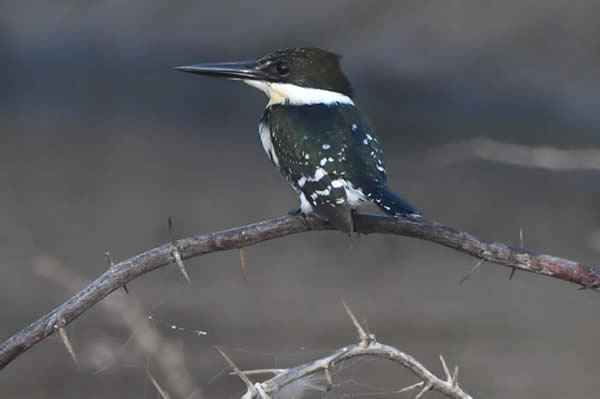
© 2018 Callyn Yorke
Troncones, Guerrero MX 6 April 2018
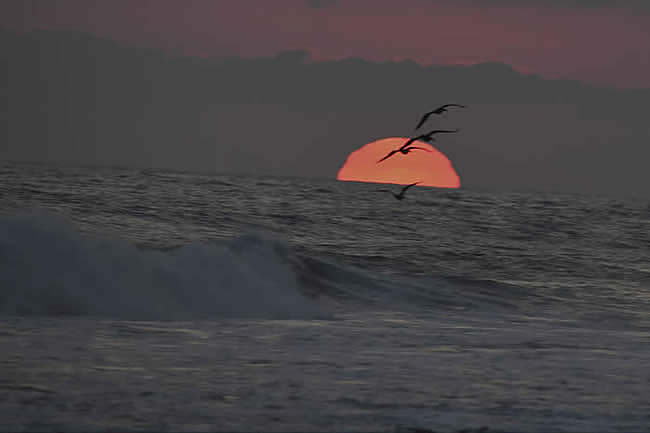
© 2018 Callyn Yorke
Barra de Potosi
Green Iguana (Iguana iguana) adult male Refugio de Potosi , Guerrero MX 3 April 2018 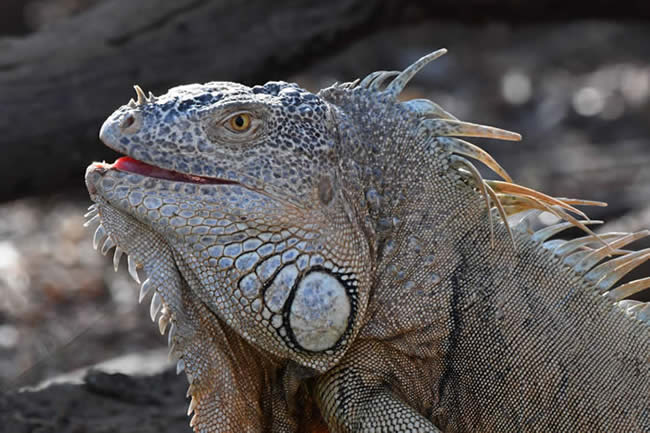
© 2018 Callyn Yorke
I made two separate day-trips to this area, located about 10-miles southeast of Zihuatanejo. Both times, I visited the private nature reserve called Refugio de Potosi, owned and operated by Laurel Patrick. The reserve is well marked on the main road to Barra de Potosi.
Refugio de Potosi includes Laurel's home, ornamental trees and shrubs, a garden pond, auxillary buildings, an iguana enclosure, about 50-acres of thorn-scrub, an observation tower, and a shallow lake. The place was quite birdy on both of my visits, particularly the hummingbird feeders, garden pond and lake.
Laurel Patrick, owner of Refugio de Potosi Gurerro, MX 3 April 2018
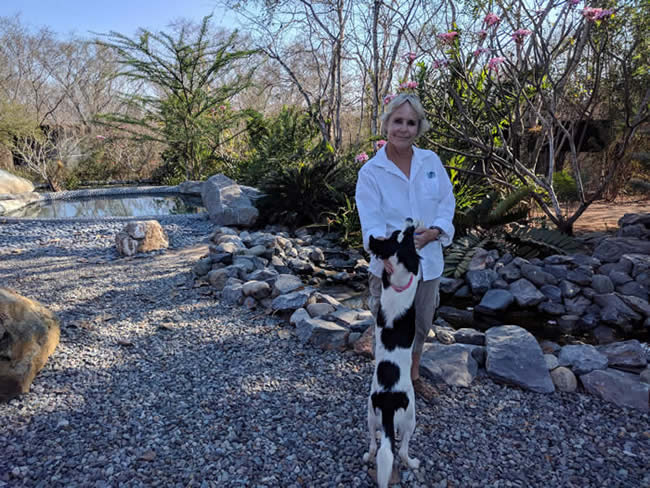
© 2018 Callyn Yorke
Refugio de Potosi: (a) view of main house and property (b) & (c) adjacent Carizzo Lagoon 3 April 2018
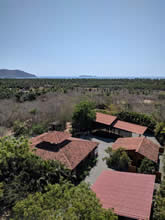
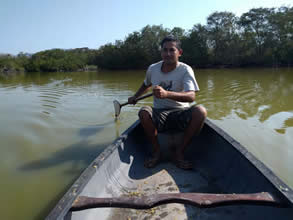
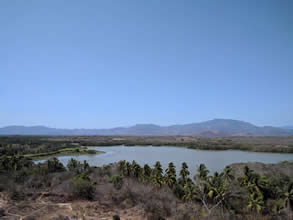
(a) (b) c) © 2018 Callyn Yorke
West Mexican Chachalaca (Ortalis poliocephala) Refugio de Potosi Guerrero, MX 3 April 2018
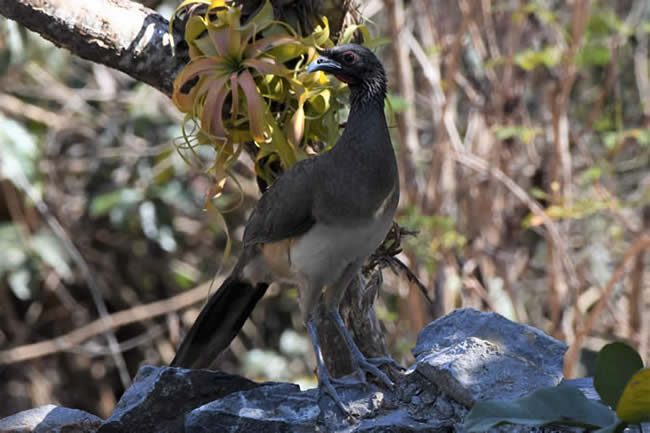
© 2018 Callyn Yorke
The biggest surprise, however, was a fully-articulated adult Sperm Whale skeleton behind Laurel's home. Several years earlier, the whale carcass had washed ashore and was salvaged by Laurel and her helpers. No one knew quite what to do with it, so Laurel did some online research and finally located a high-school biology teacher in Alaska who had assembled a Sperm Whale skeleton and, remarkably, published an illustrated instruction manual.
Sperm Whale Skeletal Articulation Manual by Lee Post Refugio de Potosi, Guerrero MX 3 April 2018 
© 2018 Callyn Yorke
Laurel and her team of volunteers went to work. The project, requiring several years, involved burying sections of the carcass to allow bacterial decomposition to separate flesh from bone. An auxillary 'carport' was contructed along with a metal scaffolding to protect and support the articulated skeleton.
Needless to say, the monumental task was an incredibly ambitious undertaking. The results were nothing less than awesome. The 30-foot long skeletal specimen -- one of only a few like it in the world -- is one of the most impressive zoological exhibits in Mexico.
Adult Sperm Whale (Physeter macrocephalus) articulated skeleton, Regugio de Potosi Guerrero, MX 3 April 2018
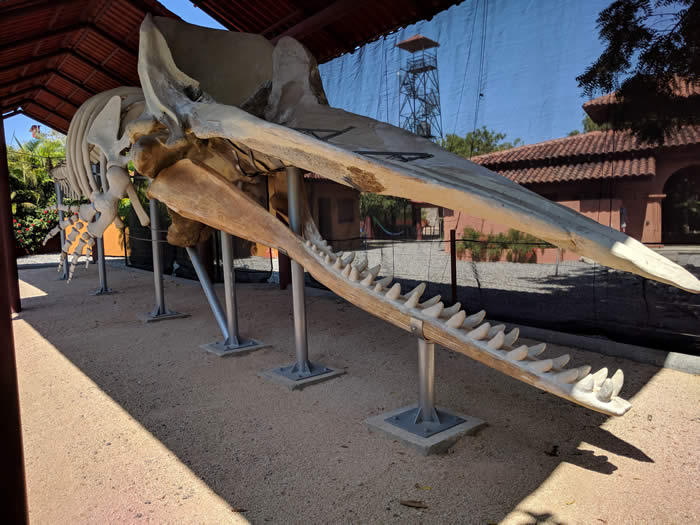
© 2018 Callyn Yorke
I spent several hours walking pathways through the Refugio de Potosi garden and adjacent thorn scrub; a canoe trip in the adjacent Carizzo Lagoon was also well worth the time and effort, which included a portage of about 100-yards. Noteworthy birds, not found eleswhere during this trip, included, Woodstork, Plain-capped Starthroat, Blue Bunting, and Black-vented Oriole.
Woodstork (Mycteria americana) Refugio de Potosi Guerrero, MX 3 April 2018
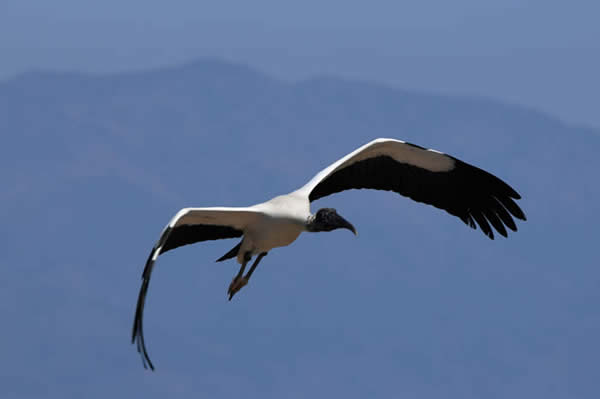
© 2018 Callyn Yorke
Plain-capped Starthroat (Heliomaster constantii) male Refugio de Potosi Guerrero, MX 3 April 2018
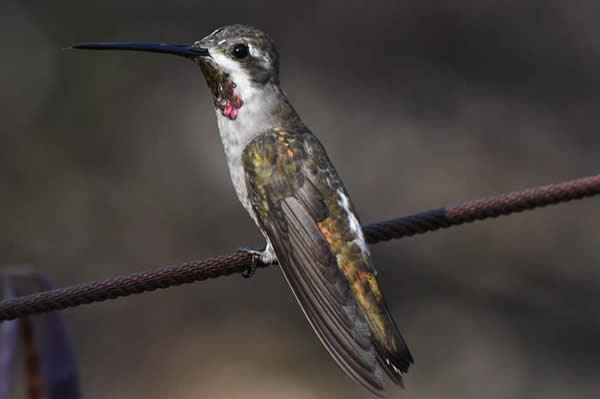
© 2018 Callyn Yorke
Doubleday's Broad-billed Hummingbird (Cynanthus doubledayi) Refugio de Potosi Guerrero MX 3 April 2018
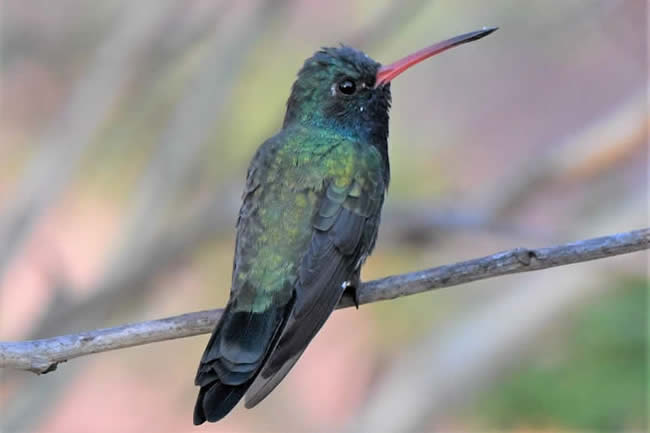
© 2018 Callyn Yorke
Blue Bunting (Passerina cyanea) female Refugio de Potosi Guerrero MX 3 April 2018
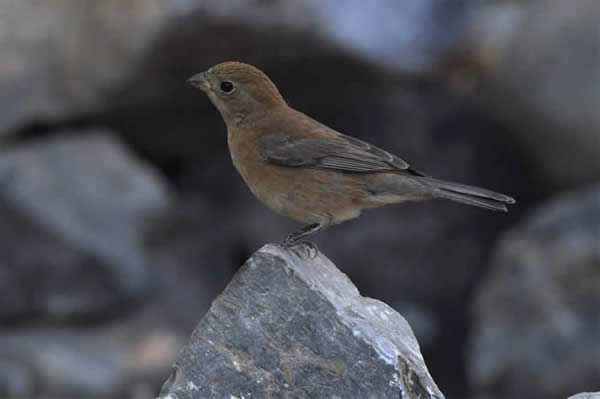
© 2018 Callyn Yorke
Black-vented Oriole (Icterus wagleri) Refugio de Potosi Guerrero, MX 3 April 2018
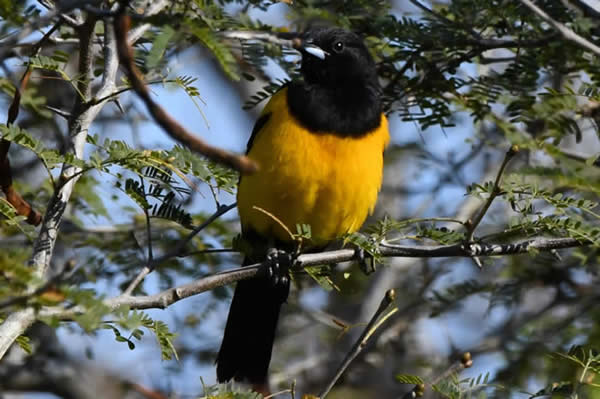
© 2018 Callyn Yorke
Barro de Potosi Guerrero, MX, viewing east 5 April 2018
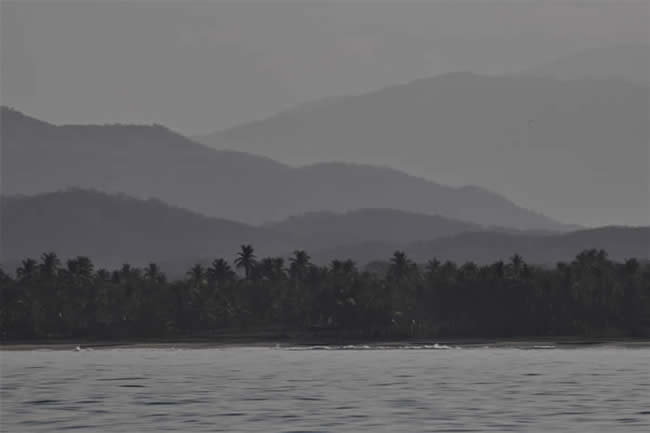
© 2018 Callyn Yorke
A few miles southwest of Refugio de Potosi is a tidal estuary known as Laguna de Potosi, part of the greater coastal settlement known as Barra de Potosi. Another two miles or so offshore are some rocks with significant seabird colonies known as Los Morros. Beginning at sunrise, I spent most of a day (April 5, 2018) exploring this area, including a boat trip to Los Morros.
Laguna de Potosi Guerrero, MX 5 April 2018
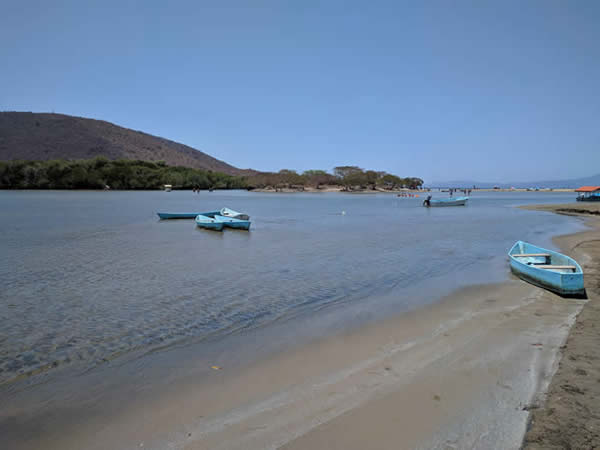
© 2018 Callyn Yorke
Mangrove & mudflats, skimmers, terns and other water birds of Laguna de Potosi Guerrero MX 5 April 2018
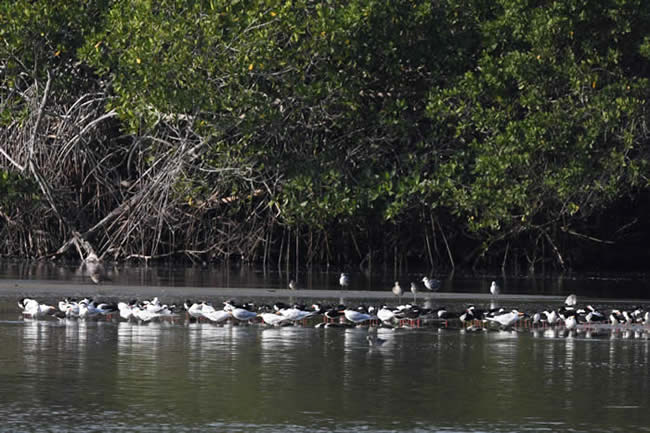
© 2018 Callyn Yorke
A few birds for my trip list were added in the Barra de Potosi area. Noteworthy species included, Brown Booby, Red-tailed Tropicbird, Royal Tern, Least Tern and Black Skimmer.
The thorn scrub and mangrove produced a family of Groove-billed Ani and a Reddish Egret fly-by.
Groove-billed Ani (Crotophaga sulcirostris) Laguna de Potosi Guerrero MX 5 April 2018
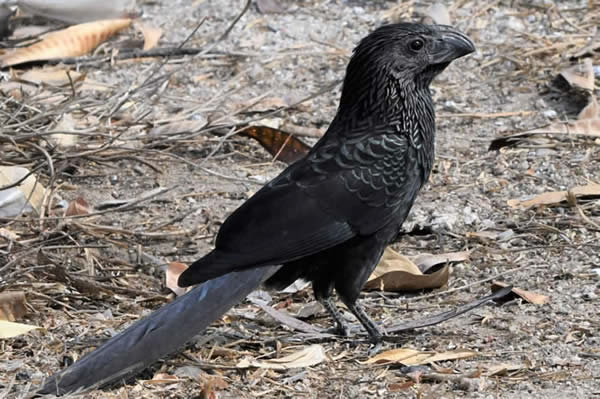
© 2018 Callyn Yorke
Reddish Egret (Egretta rufescens) Laguna de Potosi, Guerrero MX 5 April 2018
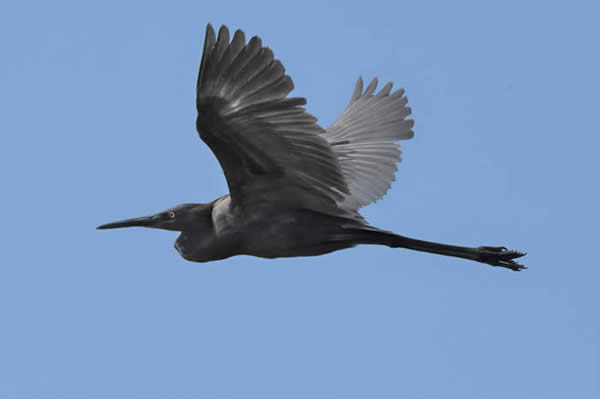
© 2018 Callyn Yorke
The 2.5 -hour Morros trip with Arturo as the boat captain and guide, was perhaps the most memorable event. We began by running aground at low tide in the estuary. Pretty much the same thing occurred when we returned, despite Arturo gunning the engine to full throttle. The difficulties we had with shallow water probably explained why ours was about the only boat tour to the Morros that morning.
Running aground on the return trip from Los Morros, Guerrero MX 5 April 2018
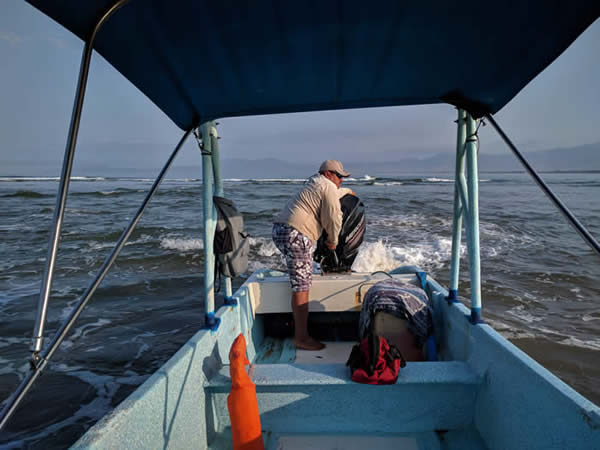
© 2108 Callyn Yorke
Red-billed Tropicbird (Phaethon rubricauda)Los Morros, Barra de Potosi, Guerrero MX
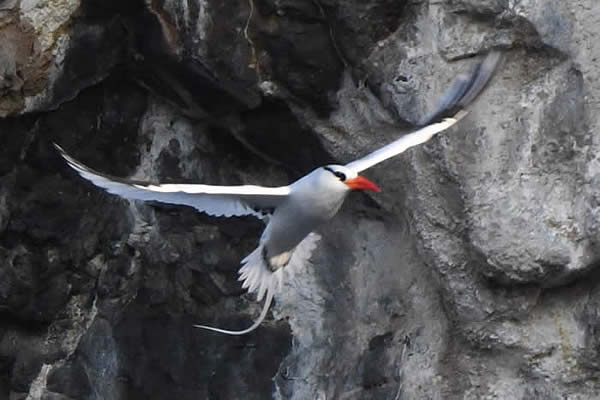
© 2018 Callyn Yorke
Brown Booby (Sula leucogaster) Los Morros, Barra de Potosi Guerrero MX 5 April 2018
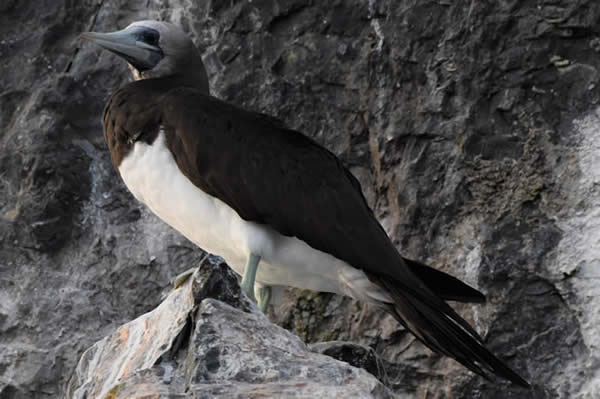
© 2018 Callyn Yorke
Magnificent Frigatebird (Fregata manificens) far right; BRBO left, Los Morros, Barra de Potosi, Guerrero MX
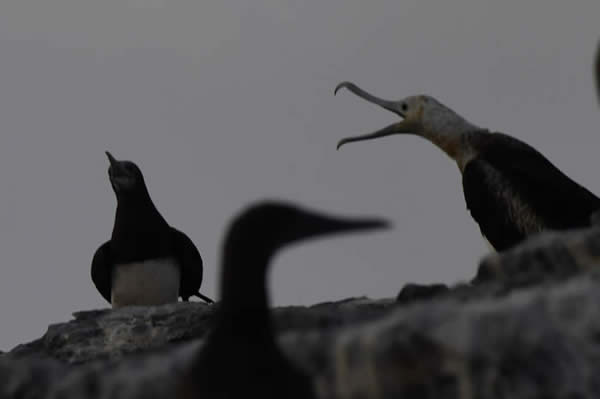
© 2018 Callyn Yorke
Los Morros, Barra de Potosi Guerrero, MX 5 April 2018
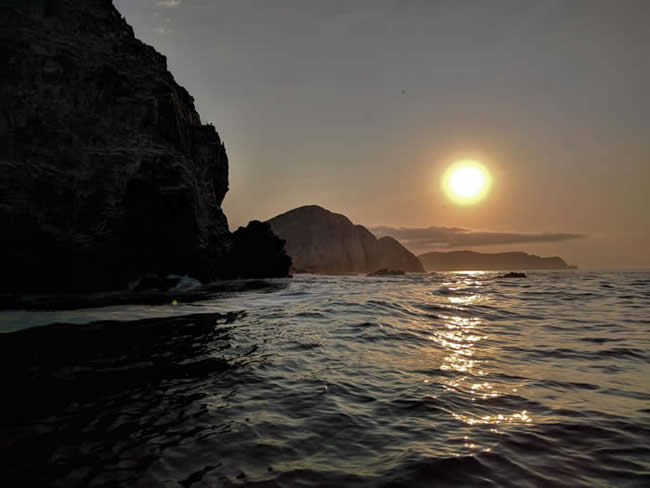
© 2018 Callyn Yorke